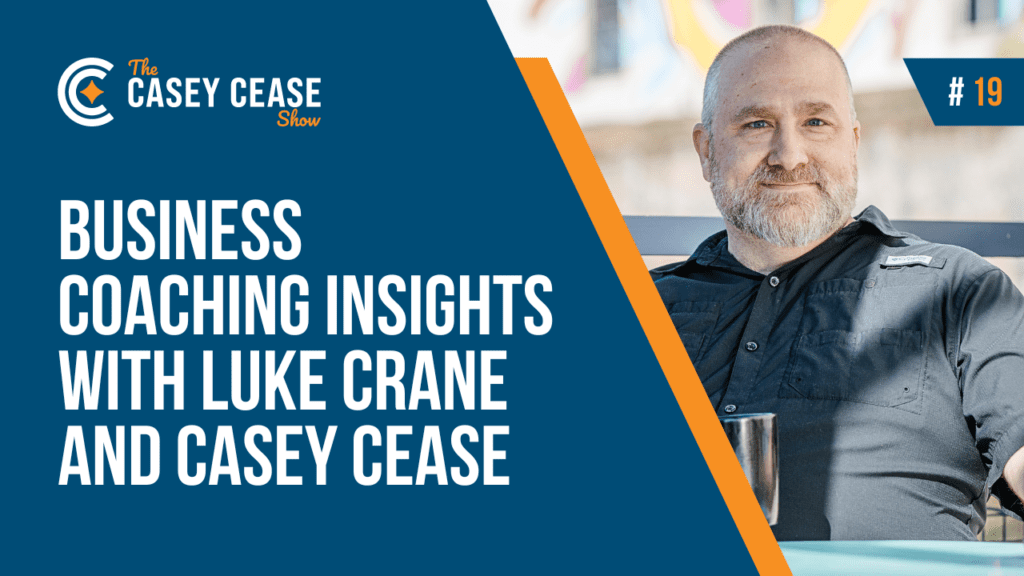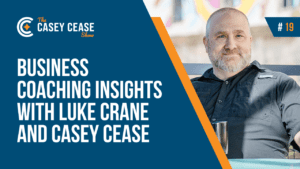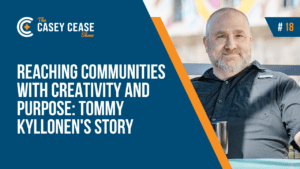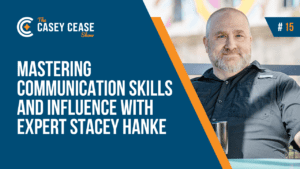[00:00:00] Welcome to the Casey Cease Show. Casey is your entrepreneurial guide. Dive into weekly insights that blend inspiration with practical strategies to grow your business with integrity. From boosting sales to building strong relationships, Casey shares the essentials to help both your venture and personal dreams flourish.
[00:00:18] Ready to elevate your entrepreneurial journey? Let’s dive in.
[00:00:28] Casey Cease: Welcome back to another episode of the Casey Cease Show. This is Casey and I’m here with my good friend, Luke Crane today. And Luke and I are going to be chatting through business and coaching and life transitions and a bunch of fun, different things and we’ve been buddies for several years now.
[00:00:41] Casey Cease: I actually met Luke years ago, we were both in vocational ministry. And we’re both in a preaching cohort at a Church in his area when I was living in that area and hit it off and have maintained friends that we’ve both entered into our journey as coaches and entrepreneurs and all that.
[00:00:55] Casey Cease: So Luke, thanks so much for joining me today on the show. And why don’t you just begin by giving us a [00:01:00] little bit of your background and share with us about your journey, your business and the different ways that you add value to people.
[00:01:06] Luke Crane: Yeah, well, first thanks for having me, super pumped. Yeah, the journey has been a long, awesome and hard all at the same time. So, I guess, every good journey starts after college, left college, did a little bit of specialized ministry training and then launched a non-profit in Texas.
[00:01:26] Luke Crane: So we had a choice, we could go to Aurora, Illinois, which nothing against Illinois. It just sounds cold or we could go to the Woodlands, Texas. And so the Texas kind of felt a little better. So yeah, we did ministry started a non-profit from the ground up order directors, the whole thing for three years and loved it.
[00:01:45] Luke Crane: It was just, I’d given it my all, I was tired, decided to go back to school ,got my master’s in Christian leadership from Dallas Theological Seminary. And then I started working in a Church, fun part, ooh, [00:02:00] this is kind of, it all adds up, right?
[00:02:01] Luke Crane: So, while I was in seminary, I did a part time job working at Apple, learned a ton, became a trainer for an Apple store and it all bled into the end.
[00:02:12] Luke Crane: But I left that, I started working for a Church, it’s where I met you. I would did communications and digital strategy which I didn’t know there was a Pastor title called Pastor communications and digital strategy, but there is, well, there was, I think they created it for me.
[00:02:28] Luke Crane: Worked there for almost three and a half years, ended up running the whole communications team, loved the team, loved what we did, work with creatives and work with the whole Church staff and Church team, hoping with communication. That time was super impactful for me, but the team was the big part.
[00:02:46] Luke Crane: And then when I left that, I started, I fell back into technology. I don’t know why I’m not a tech guy, but I just fell back into technology. And I ended up doing tech training for another two years and I’d always told myself for the [00:03:00] longest, like I’m not an entrepreneur, I don’t have that spirit. I don’t have, that’s not, it’s not who I am, blah, blah, blah, blah.
[00:03:05] Luke Crane: And I kept saying it to myself and you know, you keep saying it to yourself, you start to believe it and I truly believed it. And I was at the three year mark with this company and an ad popped up, I was doing the Facebook scroll and an ad popped up to become a coach.
[00:03:24] Luke Crane: So I’d seen it once and you kind of, you know, but when you pause on it, you know, this more than most with the marketing, you pause on it and they gotcha, I paused. So then I started seeing it all the time. So I asked my wife I said, hey, what would you think if I left this and started my own company doing coaching?
[00:03:47] Luke Crane: And I kid you not, these are her exact words. She said, it’s about time. And when your wife says it’s about time, the person who knows you the best, then it’s probably past that about time. So, I stayed for a little bit [00:04:00] longer cause I don’t believe in jumping without a full knowledge of what you’re doing. So I stayed a little bit longer. I did a training course on coaching, got certified as a coach and I got my first client. And then I left my job and ranched out on my own.
[00:04:16] Luke Crane: So that was almost four and a half years ago. Since then it’s evolved a little bit, the coaching has always been there, but I’ve found different avenues of business and things that I’m good at, training, speaking in front of people and funnily enough, developing custom curriculum.
[00:04:34] Luke Crane: So, that’s what I do now, I coach, I specialize in entrepreneurs. So I really like to work with people who run the company, that’s my niche. But yeah, it’s been a journey, well, it took me about 14 years to figure out what I wanted to do, but now I got it. So I don’t think I’m going to stop anytime soon.
[00:04:51] Luke Crane: That’s the journey, man.
[00:04:52] Casey Cease: Yeah, no, I appreciate sharing that. You know, you’ve authored a book, you’ve created courses, you’ve right. And so there’s a lot of things along the way [00:05:00] that I think are are really interesting. And I have a tendency to do that as well and take for granted kind of what I’ve done.
[00:05:05] Casey Cease: I posted this on social media a little while ago, I said, you know, I was recently talking with a friend and he was shocked to find out that I own a marketing agency. Like he just assumed like, yeah. And I was like, Oh yeah, I take for granted everything that I’m involved in because for me it’s just a part of life, a way of doing things. But for you, I mean, you are a strong content creator, you are great at creating courses.
[00:05:27] Casey Cease: And so let’s talk a little bit about the, I mean, you’re an excellent coach. You really do care about the people you lead. You have the pastoral element with the strategy element. And a solid business guy, how does the curriculum in your book and things like that all work together with all of that?
[00:05:42] Luke Crane: Yeah. So the book came from, I don’t know if you probably talk to an author. It kind of welled up inside of me. I read a book about writing books and a friend of mine had at the time said that a book is the best business card you can ever have. And business wasn’t great. So I was [00:06:00] like, cool, I need a great business card, let’s write a book.
[00:06:02] Luke Crane: So I read a book about writing a book. And I tried doing it the book’s way and it was terrible case, it was absolutely terrible. And so literally, I’m sitting at my desk going, what am I going to do? This is garbage, I’m garbage and I turned around and my bookcase was behind me and I looked at all the books on my top shelf was my favorites, right?
[00:06:24] Luke Crane: So it was kind of the descending. And my top shelf, it was like Patrick Lencioni it was Ken Blanchard, like all of these fable fiction, like fable stories that people want to read short, quick, but they have a point. And so I thought, well, if that’s my favorite to read, maybe that’s the kind I should write.
[00:06:44] Luke Crane: And I have a fun degree, my undergrad is in outdoor experiential education. From Appalachian State come out near and so backpacking and being outdoors is kind of my thing. And [00:07:00] so I ended up writing the book about leadership, from the perspective of a backpacking trip and this, and so that content flowed, like you asked about how the content all links together, that one weld up inside of me and I had to write it.
[00:07:13] Luke Crane: The other stuff, you know, I think it’s hilarious and sad all at the same time that saying the simple thing in a simple way over and over again, it works. I don’t have new ideas, I don’t have grandiose ideas. But my dad told me this, he said, if you can make things simple for people, then you won’t have to worry about what you’re going to do.
[00:07:36] Luke Crane: So, when it comes to content, I just write what makes sense. And so leadership development, whether it’s, you know, if I’m writing about communication, then I don’t try to come up with a brand new shiny idea, I’m not trying to rock the boat. I just write what makes sense in a way that structure it in a way that people can read it and it makes sense.
[00:07:57] Luke Crane: Ideas build on one another all [00:08:00] that kind of stuff. So it all flows together and the content is not revolutionary. I don’t think I’m ever going to be revolutionary.
[00:08:06] Luke Crane: But I do like making complex things simple and that’s the quote. When you make the complex simple you’ll never have to worry.
[00:08:13] Casey Cease: So, I was speaking with 1 of our authors recently and he was in an organization that would do these very simple trainings weekly with their staff. And the first six weeks, he’s like, I’m not really into this, this is silly. And then about six weeks in, he’s like, this is extremely helpful.
[00:08:29] Casey Cease: And because what happened is it brought about alignment with the team and what he, his area he was making as a leader in the organization was that, of course, people know how to actively listen. Of course, people know etiquette on email and what he found was he was shocked by how many people were acting like their mind was just blown from very basic content.
[00:08:51] Casey Cease: And I said, you know, the accumulation of that training, he said that it raises the water, the level of alignment with the team. And you do have a [00:09:00] unique gift at being able to take some complex concepts and make it very simple. And what’s nice is when it’s done simply, but done well, it’s not condescending, it’s actually liberating.
[00:09:10] Casey Cease: And you walk a very fine line because there are some things I’ve read, having owned a publishing company now for 17 years, that are just condescending. And people are trying to be helpful and they’re just rude, but you actually do a very great job at breaking things down.
[00:09:25] Casey Cease: One of the things that we worked on together as a project was we helped you lay out and think through the strategy of a white label curriculum for leadership development. You know, and so that was a lot of fun for us to just think through the logistics, but watching you work through that and come up with it and then connecting with people who have purchased it and have had you facilitate through it and be blown away by the impact it’s had.
[00:09:49] Casey Cease: So how did you come up with this idea of creating a white label type of curriculum? And then how have you seen it implemented with successfully?
[00:09:56] Luke Crane: Existing client I was coaching is [00:10:00] a, it’s a firm. And so I was coaching multiple members of the firm and I was talking with the head of the firm and he said, I want to grow leaders but I want to create something that has our touch and our feel to it.
[00:10:14] Luke Crane: But I want to give them the meat, but I want it to feel like us. And so we embarked on a, I mean, gosh, we took eight months to create a solid core curriculum. And funnily enough, it wasn’t until after I’d created the core that we had the fingerprint conversation. So that was an alignment conversation that we had where he said, this isn’t what I want, here’s what I want.
[00:10:36] Luke Crane: And I said, Oh no. So I quickly you know, imprinted, I call it the fingerprint. I imprinted his fingerprint and the culture into the curriculum. And that’s what sparked the idea of man, if I can take the core concepts of leadership, which, you know, are everywhere, communication, accountability, you know, all of those things, and I can put them simply, [00:11:00] and then I can take it to different people and they can add their cultural fingerprint to it.
[00:11:05] Luke Crane: We can have a base and they can decorate the house. You know, we can have a frame and walls, but they get to decorate and it feels like theirs and then that kind of sparked the, man, I should white label this. And for anyone who’s listening, who doesn’t know what a white label is, it just means, I made it, we get to tweak it and you get to call it your own.
[00:11:25] Luke Crane: So that’s what a white label is.
[00:11:26] Casey Cease: It’s customizable for the specific culture, but the leadership principles are the leadership principles. Right?
[00:11:32] Luke Crane: Right.
[00:11:33] Casey Cease: And so you’ve created a framework of any organization or leadership group that wants to develop leaders has, like you said, certain principles that they need to learn and understand and follow.
[00:11:45] Casey Cease: And your unique ability is to come in with the higher ups and say, let’s make it yours. And so then they have it in, but then also there’ve been a few large organizations that have actually invited you in to do the training as well.
[00:11:59] Luke Crane: Yeah, [00:12:00] there has and that’s been super fun to be able to write the content and to deliver it. I get to expound on the ideas a little bit more and facilitate conversation around it versus just here you go, here’s your stuff. So that’s been a little more intimate with the content and seeing how it resonates and what people talk about, what lands, what doesn’t and it’s been super fun watch those people get it and take it back into the workplace versus just, you know, it’s less transactional.
[00:12:28] Luke Crane: So I’ve had a lot of fun hearing that and doing those trainings. In fact, to have one tomorrow. So with that company.
[00:12:34] Casey Cease: Yeah. So with that, how does that all work together? Your content creation, your curricula, your coaching, how do you see that as your firm continues to grow? And what is the name of your firm? We forgot to mention that.
[00:12:46] Luke Crane: Oh yeah. So it’s a leadership cohort is the name of it. LeadershipCohort.com. Cohorts, a weird word to spell C O H O R T just in case you’re wondering. And the idea behind it was I wanted a group of individuals [00:13:00] who cared about leadership to come together. And so that’s kind of what a cohort is.
[00:13:05] Luke Crane: And so I wanted it to be a cohort of leaders. And so that’s why I named it leadership cohort. Not until later did I realize that it’s LC and my initials are LC. And so that works out too on a business card in case you’re wondering. But yeah, how does it all fit together? I’m an avid reader and as I read, stuff comes out in my content.
[00:13:25] Luke Crane: So if I’m developing curriculum, it’s coming from live coaching conversations with leaders. If I hit on a pain point or I notice a theme that I talk about often, I know that theme needs to be inside of a curriculum. For example you know, I mentioned extreme ownership, like having, thinking and an owner mindset that’s something that I hadn’t written in the original white label and having multiple conversations with entrepreneurs has helped me realize that ownership element needs to be in a white label for leaders as well.
[00:13:59] Luke Crane: And so [00:14:00] they kind of play off each other and it keeps me fresh content for the white label. But then as I deliver on the white label and help customize that for these cultural footprints or cultural fingerprints, that also helps me go into my coaching conversations and say, hey, this is the idea, but how do we fit that to your people?
[00:14:20] Luke Crane: Because every team is different, every group is different. So, they play off each other extremely well.
[00:14:26] Ready to skyrocket your business and truly connect with your audience on a whole new level. Unleash the power of your story with Lucid Books. Imagine transforming your insights and experiences into a captivating book that not only cements your status as a thought leader, but also weaves a strong bond with your ideal clients at lucid books.
[00:14:45] We’re more than a publishing house. We’re your creative partners on a journey to turn your wisdom into a masterpiece that speaks directly to the hearts and minds of your audience. Join forces with us and let’s embark on this incredible adventure together. Your story [00:15:00] has the power to inspire, engage, and elevate.
[00:15:03] Are you ready to share it with the world?
[00:15:11] Casey Cease: So when you work with a client, they come to you and they say, hey, I need to grow. What I’ve noticed as a coach is a lot of clients come and their symptoms are caused by deeper issues. And so as you started coaching, did you start coaching during the pandemic or prior to or afterwards?
[00:15:29] Casey Cease: Like when did you really kick that off?
[00:15:32] Luke Crane: Yeah it started about six months before the pandemic.
[00:15:36] Casey Cease: So you’ve coached through it and following?
[00:15:38] Luke Crane: Yes.
[00:15:39] Casey Cease: And so what are some underlying themes that you’ve noticed with the folks that you coach going through? Not just that, but as you’ve done it now for several years, what are the things that you’re finding that you’re really able to help coach people through beyond just the, I need more sales or I need better leadership.
[00:15:57] Casey Cease: Like what are some real issues that you’re finding [00:16:00] people might be able to recognize that they would benefit from working with a coach?
[00:16:03] Luke Crane: Yeah. I’m just thinking back over, cause you hear things repetitively. So I’m thinking over the last couple of conversations that I’ve had. What immediately comes to mind is, we call it limiting beliefs but it’s the head trash that we’ve been telling ourselves that we’ve allowed to become reality.
[00:16:19] Luke Crane: And that’s some of the stuff that just, it gets stuck, right? It gets stuck in our heads. So I work with a lot of people on limiting beliefs, and that’s a root cause, right? If you think something is truth, then you’re going to act on it as truth. And so as a coach, when I have these conversations, I always tell people, the only way to help crazy is to hold up a mirror.
[00:16:40] Luke Crane: So oftentimes when they say, Oh, I’m not good at this or I’m not good at that. My job is to hold up a mirror and go, so you’re telling me you’re not good. Tell me how you are not good at that. And they fumble but that’s a root thing that I’m constantly going through limiting beliefs.
[00:16:55] Luke Crane: You know, something else when you bring on a coach, it brings on an element [00:17:00] of accountability, self accountability for folks is, I mean, for me, even it’s super hard and, you know, if you’re a business owner, if you’re just a leader in a company, self accountability, unless you’re highly disciplined, and I know some people who are, and they’re very few and far between self accountability is super hard.
[00:17:21] Luke Crane: And so to hire a coach who can come in and call you on the things you said you were going to do, coaching doesn’t work without action, right? So to be able to go, hey, you said you were going to do this, where are you at on that? Even just the idea that they said it to someone is more powerful than just saying they’ll do it someday. Right?
[00:17:43] Luke Crane: So the accountability element has been huge in coaching. I had one guy I talked to the other day and he said, I was super excited about our conversation because I got this done and this done and this done, and I wanted to tell you about it. Right?
[00:17:55] Luke Crane: So he gets to celebrate the wins, but he’s also accountable to the fact that he did the things he was supposed to [00:18:00] do and he was excited about doing them.
[00:18:02] Luke Crane: Yeah, I mean, there’s so much, there’s a lot of different covers. I mean, you know, you coach, there’s a lot of different conversations you have. But really when it comes to the root of things, that accountability and a lot of the self doubt and limiting beliefs is, a lot of what it comes to.
[00:18:18] Casey Cease: Yeah I agree. I work with a lot of upperly mobile, you know, earning high six, seven figures personal income a year. And there are two primary things I see, which is leadership is lonely and relationships are increasingly more complex, both at home and in the workplace because of the level of pressure that a leader is facing as their career continues to expand as their children age, And the cost of that type of success comes out from different places, whether it’s their health or their marriage or the relationship with the children or addiction or really bad habits, like there’s a [00:19:00] cost somewhere involved.
[00:19:01] Casey Cease: And so it may manifest as our leadership team is off or our you know, the sales are declining or the profitability is in trouble, which we address completely. But when you get behind there, I remember talking to one guy, he was very successful, but I was like, well, anybody tell you’re wrong?
[00:19:19] Casey Cease: And he’s like, no, he’s like, and I’m begging for it. And I’m like, well, one, you’re kind of intimidating, but two, it’s like, you’ve got to invite that pushback because your success has gotten you to this level. People think you need them to do stuff, but not really speak into it.
[00:19:35] Casey Cease: So he likes me because I’ll be honest with them and direct and saying like, I think that’s bad idea because of this, and this. And I said, I could be wrong. That may not be accurate feedback, but ultimately that kind of care shown for him actually builds even more trust in the coaching relationship.
[00:19:53] Casey Cease: And so being able to work as a coach with these folks and have that discernment plus [00:20:00] with you just having so much dynamic wisdom, not only in business, but in leadership and ministry and just you’re great with people, I’m sure it opens up a lot of opportunity.
[00:20:09] Casey Cease: You were sharing with me. I mean, typically as a coach, if someone sticks around a year, maybe two years. That’s a really good run for you and for them. You have several that have stayed with you a really long time. And how have you noticed the coaching relationship maturing over the years with people that you’re working with under the method that you’re coaching?
[00:20:29] Luke Crane: Yeah. The people who have been with me for two years know that my coaching changed about a year ago, and it’s gotten better and I’m getting better. But one of the things that I struggled with in the beginning is kind of what you talked about is I struggled to challenge.
[00:20:47] Luke Crane: I wanted to be a friend and I didn’t want to be a coach at that point, cause I thought that I would offend people by calling them on their stuff. And so, you know, I’d try to dance around the point, I’d hold up a mirror and say, [00:21:00] is this really the case? And about a year or a year and a half ago, I read a quote, and it said coaching is comforting the afflicted and afflicting the comfortable.
[00:21:09] Luke Crane: Comforting the afflicted if they’re in pain, you want to be the comfort. Hey, you can do this. I’m your biggest fan. Borrow some of my confidence right now. But the real fun comes in afflicting the comfortable you know, you talked about that person that you were coaching who it was really about them and a job of a coach is to afflict the comfortable. And so about a year ago, my coaching changed.
[00:21:33] Luke Crane: And I started afflicting a lot more people. I know it sounds weird, but calling people on their stuff saying that’s not a good idea or you’ve thought through that or sometimes I fall back into the friend zone, but you know, going, Hey, let’s play that out in the next year. Okay?
[00:21:48] Luke Crane: Let’s just play that out. How is that going to work out for you? With the longevity of clients though, some really fun things have happened. I have had a couple clients who are almost at the two year mark [00:22:00] and I get to, because I know them and because we’ve been together for so long, I can gauge their facial expressions differently.
[00:22:07] Luke Crane: I don’t coach over the phone, I coach on video or in person. So I get to gauge the facial and you start to read those pauses differently. You know, what are you thinking right now? I know what you’re thinking right now. I want you to say what you’re thinking right now. So you get to get ahead of that a little bit.
[00:22:22] Luke Crane: But I think the best part is to be able to go, Hey, let’s look back at a year ago. Like you think times are tough right now, you called me back then and you were barely making enough money to survive. Right?
[00:22:35] Luke Crane: And now you’re saying that your account being too full is your biggest problem. So can we just pause and look back for a second?
[00:22:43] Luke Crane: And that’s been the most fun with those people who I’ve had a lot of longevity with. It’s helping them reflect back on the growth that they’ve had and realize that it truly is growth. So,
[00:22:54] Casey Cease: No, that’s a great point. I really appreciate the way you’ve put that together [00:23:00] where the pausing to look backward because a lot of achievers that we coach, the driven people forget the past. Right?
[00:23:08] Casey Cease: The blinders are on and they’re only grinding forward. And it’s funny because when you stop and say, Hey, hold on, I know we can go back to being mad or frustrating just a minute, but if I recall correctly, wasn’t it you that had blank and sometimes I’ll even mess with them and make it a little bit better sounding than it was like no, it was this, you know, I, our bank account was like negative 200,000, right?
[00:23:30] Casey Cease: You like, I was like, what’s it like a negative a hundred that like, no, it was too hot. I like, and where are we today?
[00:23:34] Casey Cease: Well, we only have 1. 2 million right now. I’m like, you’re up 1. 4 from our last conversation. Well, okay.
[00:23:44] Luke Crane: Say that again.
[00:23:44] Luke Crane: Personality types, like you’re saying with coaching people like I, for some reason, people with an eight type on the Enneagram love coming to me for coaching because I’m not another eight, I have some eight, I’m a three wing two. So I’m not a complete jerk, but I’ll pop them on the nose. It’s like a puppy when they’re [00:24:00] of bit and you hit them and they almost look surprised.
[00:24:03] Luke Crane: I have one client, he’s trying to be a close friend but I pop him on the nose He kind of looks shocked at me and then he starts smiling like you’re the only person on the planet besides my wife that will get my attention that way.
[00:24:15] Luke Crane: Yeah. I have one guy he owns a very successful music school. And he could be one of my favorite all time coaching clients. He’s so good, he stopped for a little bit and I begged him to come back. I begged him, he didn’t beg me, I begged him. But when I would say like the things that he needed to hear, he’d cross his arms and he’d go, oh, man, that hurts. Yep, okay, thanks for that. We can end now, that’s good.
[00:24:44] Luke Crane: Cause you know, and oftentimes with leaders or with business owners it’s them in their own head. You said it well, they’re lonely. Every decision they make is on them, every step is on them and they don’t have anybody to bounce ideas or challenge them.
[00:24:58] Luke Crane: So it’s super fun. [00:25:00] It really is.
[00:25:02] Casey Cease: Absolutely. Well, man, what’s one question I should have asked you that I didn’t.
[00:25:06] Luke Crane: Man, well, technically that is a question. So you just did what’s the one question you should have asked me? You should have asked me what advice would I have for people who didn’t want to be an entrepreneur but couldn’t help themselves? That’s the question.
[00:25:23] Casey Cease: So Luke, I have one question for you. What advice would you give to someone who didn’t want to be a entrepreneur, but just couldn’t help themselves.
[00:25:33] Luke Crane: Yeah. I would tell them this, that the hardest things in life are the things that are the most gratifying. And you will never know how gratifying it is until you try. And the stats aren’t great, right? We know this, the most people who start a business if they last past the three year mark.
[00:25:59] Luke Crane: [00:26:00] Then they’re doing really well, right? If you pass the five year mark, then you’re in the, you know, 15, 20% of businesses that start. So you’ve beat out 80% of people who’ve started their own business.
[00:26:11] Luke Crane: But regret is not a fun pill to swallow. And I think for me in my journey is if I didn’t know what it was like, then I would have regretted it. Even though I didn’t want to be an entrepreneur.
[00:26:28] Luke Crane: Some days, most days, I’ll be real with you. Most days I don’t want to be, but there are the glimmer days where I get freedom.
[00:26:37] Luke Crane: So if you’re longing for freedom, do your thing. Plus you get to, ah, man, you got me on a rant now. Steve Jobs said, I don’t want to, I’m going to butcher his quote, but basically he said, I want to ding the universe, right? I want to ding the planet. You don’t get to do that living somebody else’s dream or working on somebody else’s dream. You only get to do that if you try.
[00:26:58] Luke Crane: So that’s what I [00:27:00] would say to someone who what, I think we talked about it. Not want your preneur, what’d you call it?
[00:27:05] Casey Cease: Don’t want your preneur..
[00:27:07] Luke Crane: Don’t want preneur. Yeah. Don’t want your preneur. That’s what I would say. And it’s, you don’t have to jump out of the boat.
[00:27:14] Luke Crane: You can just see what it’s like in a dinghy next to the boat for a little bit. It’s not the water’s fine. Let’s put it that way.
[00:27:20] Casey Cease: Well, Luke, where can people find you online? How can they connect with you?
[00:27:23] Luke Crane: Yeah. A great question. I am on Instagram and Facebook leadership cohort. L cohort on Instagram and L cohort on Facebook. I have a personal Luke Crane is my personal Facebook. I don’t post much business on there. But I do post quite a bit and often on a leadership cohort. Or you can find me online LeadershipCohort.com, or you can email me Luke@LeadershipCohort.com. So
[00:27:52] Casey Cease: Well, Luke, thanks so much for taking the time to join me today. And I’m sure we’ll have you back sometime soon.
[00:27:57] Luke Crane: Thanks Casey. Appreciate you.
[00:27:58] That wraps up this episode [00:28:00] of the Casey Cease Show. Make sure to visit our website, thecaseyceaseshow.com, where you can subscribe to the show on iTunes, Spotify, or via RSS, so you’ll never miss a show. While you’re at it, if you found value in this show, we’d appreciate a rating on iTunes, or if you’d simply tell a friend about the show that would help us out too.
[00:28:21] You might also want to check out our book for business consultation available at lucid books or double your sales strategy session at planify agency. Be sure to tune in next week for our next episode.






